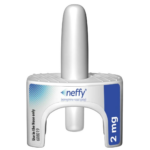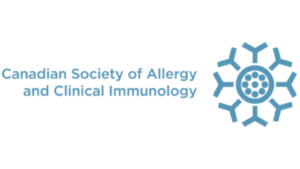Join our efforts with the government in advocating for our National Food Allergy Action Plan. Get an update on access to oral immunotherapy (OIT) in Ontario and read about the formal filing to have neffy® epinephrine nasal spray in Canada. Plus, learn about the results of a 3-year study on the peanut patch in toddlers and discover new research on panel food testing for diagnosing food allergy and read the Canadian Society of Allergy and Clinical Immunology’s (CSACI) recommendations on panel food testing for diagnosing food allergy. Check out our mythbuster on skin prick tests.
Advocacy: Parliament is prorogued, but our advocacy with government continues – join us in our efforts

Since our October visit to Parliament Hill in Ottawa, we have advanced awareness and support for the National Food Allergy Action Plan by engaging with Senators and the Minister of Health’s office.
While formal parliamentary business is paused until March, MPs remain active in their local ridings. As a federal election may be announced in the coming months, we are aiming to connect with current and prospective MPs and we need your help!
Interested in supporting our advocacy efforts and meeting with party candidates in your riding to help #MakeFoodAllergyCount? Contact us at info@foodallergycanada.ca and use the subject line “Advocacy”.
Advocacy: ARS Pharma files for approval of neffy® in Canada

ARS Pharmaceutical has filed for approval of neffy®, epinephrine nasal spray, with a 2mg dose in Canada, on behalf of its licensing partner ALK. This dose is for treating anaphylaxis in adults and children weighing 30kg (66lbs) or greater. In November 2024, ARS Pharma announced a licensing agreement providing ALK with exclusive rights to distribute neffy® in Canada.
neffy® is the first epinephrine product approved by the FDA for the treatment of anaphylaxis that is not administered by injection.
We have been advocating with government and the pharmaceutical companies to ensure Canadians have timely access to this device, and more than one treatment option. We’ll keep you updated as we learn more.
Advocacy: Oral immunotherapy (OIT) resumes in Ontario

Last year in Ontario, many people who were currently in oral immunotherapy (OIT) treatment indicated that their allergist paused treatment citing issues related to provincial billing. Because there was a pressing issue in Ontario, we focused our efforts for access in that province.
After several months of ongoing discussions with the Ministry of Health in Ontario and Canadian allergists, we are happy to report that allergists who previously offered OIT have resumed providing this service to their patients. If you or your child were enrolled in OIT or were considering this option with your allergist, we recommend contacting them directly to confirm the current availability of this treatment.
We recognize that the past few months have been a challenging time for those undergoing OIT treatment and we heard your concerns. Our ongoing advocacy efforts centered on restoring access and securing additional support for those in need across Ontario. Thank you for those who shared their stories with us. We appreciate your ongoing engagement and will provide additional updates as they become available in the coming months.
We remain committed to being your voice and continuing to advocate for access to affordable treatment options that can improve the safety and quality of life for Canadians of all ages.
Research: DBV Technologies announces positive 3-year results with VIASKIN® Peanut patch in toddlers

The VIASKIN® Peanut patch is an epicutaneous immunotherapy (EPIT) treatment where a patch containing a food allergen (in this case peanut) is applied to the skin. DBV has announced data from their EPITOPE Phase 3 OLE study demonstrates continued improvement in the treatment benefit of VIASKIN® Peanut patch in toddlers aged 1-3 years through 36 months.
Currently, EPIT is only available through research studies. We will keep you updated on new developments in the food allergy treatment landscape. As new treatment options emerge, we will continue working hard to ensure Canadians have access and choice in how to manage their food allergy.
Research: Critical concerns and recommended practices for the use of panel food testing for diagnosing food allergy

The misdiagnosis of food allergy remains problematic. In November 2024, the Canadian Society of Allergy and Clinical Immunology (CSACI) issued a position statement on panel testing for food allergy with these concerns:
- Panel food tests have not been adequately validated as screening tests and carry a considerable false positive rate.
- The resulting false diagnoses lead to unnecessary dietary restrictions, increased healthcare costs, and significant psychosocial distress for patients and their families.
An infographic has been developed to assist patient and physician education and concludes with the recommendation: do not panel test for food allergy.
Read the full statement for more information on panel food testing, including potential harm and benefits, alternatives to this type of testing, and recommendations. You can also review research that was presented at the 2023 American Academy of Allergy, Asthma, and Immunology (AAAAI) conference on the unnecessary use of panel testing.
Mythbuster: Is it true that the higher the result of the skin prick test, the more allergic you are?
People often assume that a large skin reaction in response to a skin prick test (also called a scratch test) or a high numerical value of the sIgE (specific IgE) blood test (referred to in the past as a RAST) means that an individual is more allergic to the substance than if the reaction and score are smaller.

This is not necessarily true. While the skin prick test checks for immediate allergic reactions, and the blood test looks for specific IgE to a given food or other substance to diagnose allergy, the results alone don’t necessarily correlate with the severity of a reaction to a given allergen. For example, the result of a small red bump (or wheal) to a skin prick test for peanut doesn’t necessarily imply that an allergic reaction will be mild.
Moreover, skin and blood tests carry some degree of risk of false positives or negatives. Your allergist will work with you to confirm or rule out an allergy, based on test results and a clinical history of the symptoms. Ask your allergist what your test results mean, and what foods you should avoid.
Additional resources
This one-page sheet outlines how food allergy is diagnosed.
This webinar reviews how food allergy is diagnosed, how the results are interpreted, and the role of an oral food challenge.
Help us educate your communities and share this mythbuster with them! Find more mythbusters at foodallergycanada.ca/mythbusters.
Tags: diagnosis, mythbuster, neffy, Oral Immunotherapy, panel food testing, Viaskin Peanut patch
